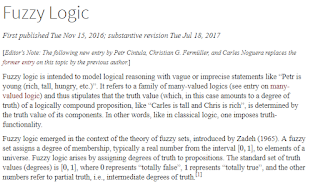 |
| East Maple Ridge |
BLACKBURN, SIMON (1996) Oxford Dictionary of Philosophy, Oxford, Oxford University Press.
Another short entry in regard to the subject of negation in philosophy, which is also a subject in the Langer, Symbolic Logic text under review on this website.
Based on Blackburn, to deny a premise/proposition as true equals asserting it as false. To asserts in negation. (99).
I deny atheism as a worldview, and at the same time assert it as false. I assert the philosophical negation of atheism as a worldview.
(This is not to state that within atheism, there are not some valid critiques)
I deny libertarian free will as a view, and at the same time assert it as false. I assert the philosophical negation of libertarian free will as a view.
(This is not to state that within libertarian free will view (s), there are not some valid critiques)
In regard to the last three images from Blackburn: That is red is contradicted by that is green, and if both are considered false, it does not exclude, for example, that is brown.
Frege texts are in German and limited to cite in English:
Negation and being by Daniel Dahlstrom of Boston University
The Review of Metaphysics 64 (December 2010): 247–271. by The Review of Metaphysics.
Frege insists, for example, that the being of a thought (das Sein eines Gedankens) may be affirmed or denied and, hence, must be distinguished from its being-true (Wahrsein).12 Thus, for Frege it is not the affirmation but the thought that is denied. In the Tractatus (§5.5151), Wittgenstein categorically rejects an asymmetricalist position: “The positive sentence must presuppose the existence of the negative sentence and vice versa.”13 (251-252), Gottlob Frege, “Die Verneinung (1919)” in Logische Untersuchungen, ed. Günther Patzig (Göttingen: Vandenhoeck & Ruprecht, 1986), 56 and following.
Analyzing this, it appears the view is that the being of thought accepted or denied, must be philosophically separated from an affirmation of it being true or false. This would connect to Wittgenstein and views of certainty which I did review for my PhD.
BLACKBURN, SIMON (1996) Oxford Dictionary of Philosophy, Oxford, Oxford University Press.
DAHLSTROM, DANIEL (2010) The Review of Metaphysics 64 (December 2010): 247–271. by The Review of Metaphysics.
FREGE, GOTTLOB (1919) “Die Verneinung (1919)” in Logische Untersuchungen, ed. Günther Patzig (Göttingen: Vandenhoeck & Ruprecht, 1986).
WITTGENSTEIN, LUDWIG (1951)(1979) On Certainty, Basil Blackwell, Oxford.
 |
| Blackburn page 99. |
 |
| Blackburn page 258. |
 |
| Blackburn page 258. |
 |
| Blackburn page 258. |
 |
| East Maple Ridge |




















